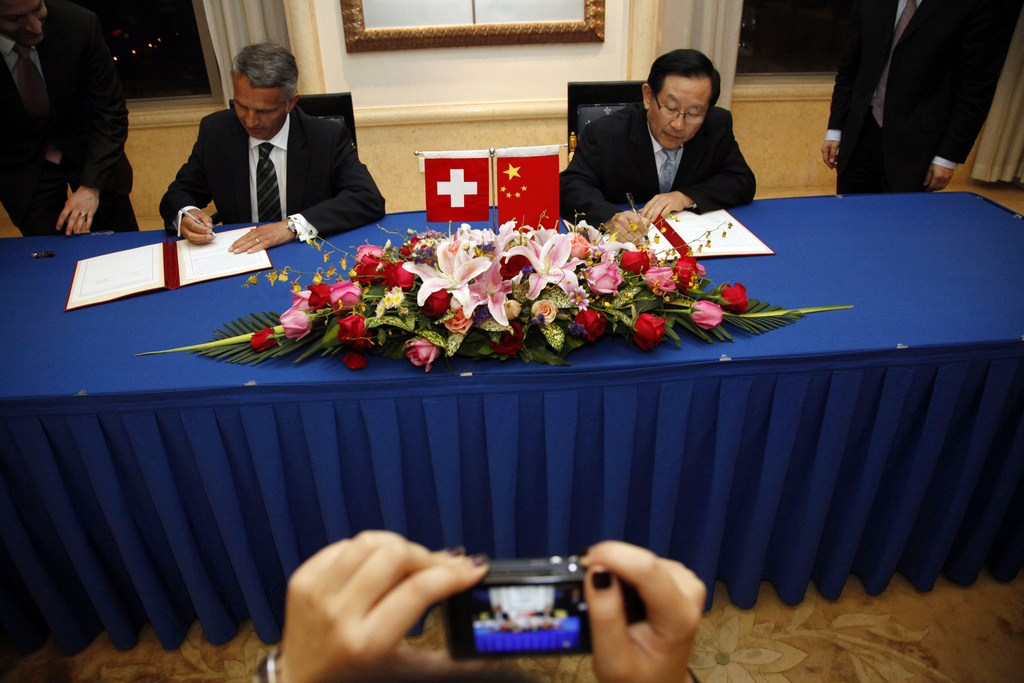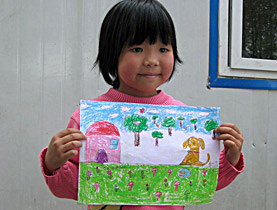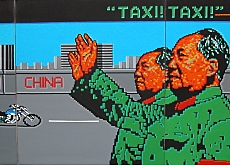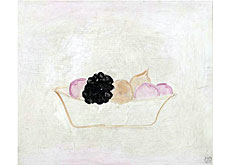Minister ends China trip with Ai Weiwei plea

Interior Minister Didier Burkhalter is returning from a visit to China to forge scientific ties, having also raised the issue of detained artist Ai Weiwei.
The artist’s situation hung over Burkhalter’s six-day trip to Beijing and Shanghai, where he held talks with Chinese ministers, as well as scientists and artists. It was not until the end that he managed to bring up Ai’s case with the government.
At the Beijing Foreign Studies University, few students were familiar with the artist and human rights activist, arrested by the Chinese authorities on April 3.
“Ai who? Weiwei? Who’s that? Never heard of him.”
Around half of those swissinfo.ch spoke to on campus knew of him but few had heard of his arrest.
Among his supporters, a young couple who are studying English and Arabic. “We greatly admire the courage of Ai Weiwei, what happened to him is appalling. He fights for justice and we dream of freedom of expression and information. Fortunately the West is protesting.”
Ai was detained before boarding a flight for Hong Kong where he was due to meet Swiss art collector Uli Sigg. He has not been seen since. A week after his arrest China said he was being investigated “in accordance with the law” for “suspected economic crimes”. Nothing is known of his conditions and whereabouts.
While the United States and the European Union have strongly criticised his arrest, there is no mention of the case on the Swiss foreign ministry website.
The ministry did however tell swissinfo.ch on April 7 of its “great concern” over Ai’s arrest and that it had contacted the Chinese authorities to express hope that the case would be resolved quickly.
Dialogue partners
It was against this tense scenario that Burkhalter made his first trip to China to strengthen scientific links between the two countries.
“The government is convinced that China is a major partner in areas that are very important to us. Above all, in science and technology, but also in economics,” he said.
So, should the issue of human rights and Ai Weiwei be raised, at the risk of offending Beijing? “Switzerland can help to make the importance of freedom understood,” Burkhalter declared.
Both countries are “global leaders” in science, he said. “When it comes to science, there is no difference in size between China and Switzerland, which allows for dialogue in all areas.”
There were a number of cultural encounters during Burkhalter’s visit. One was the inauguration of a library at the prestigious Tsinghua University in Beijing, built by Ticino architect Mario Botta.
Botta, who now lives in Beijing, expressed solidarity with the “great creator Ai Weiwei”, praising his courage.
“All voices calling for freedom are welcome,” he told swissinfo.ch, comparing the artist’s role with that of Swiss playwrights Friedrich Dürrenmatt and Max Frisch, who made “Switzerland grow”.
Ai Weiwei’s impact
That same day, in a Beijing gallery a stone’s throw from Ai’s workshop, Burkhalter said there wasn’t “necessarily enough freedom” in China.
The minister was speaking to a largely non-Chinese audience at the opening of ReGeneration 2, a show organised by Lausanne’s Elysée museum of photography.
For his part, Elysée director Sam Stourzé said “the shadow of Ai Weiwei hangs over this [artistic] quarter that he created”, even though there also exists a “freedom to exhibit 80 photographers [representative] of all schools” in this particular exhibition.
In his speech addressing the opening, Burkhalter evoked the need for “freedom of expression”, and later, describing the artistic quarter, told swissinfo.ch: “I never imagined such openness and expression [in China], but I also know that many things are difficult in this country. There is still much progress to be made.”
Before the minister’s visit was over, there was finally a chance to express “the concerns of the population and the Swiss authorities” over Ai’s arrest.
In a meeting with State Councillor Liu Yandong, a member of the Politburo of the Communist Party, he delivered the message: “This artist is expected in Switzerland at two exhibitions. He has links with our country. We are concerned about his arrest.”
And her reaction? “She responded in a detailed manner, as part of the dialogue between authorities,” he said. No more details were given.
Interior Minister Didier Burkhalter described his trip to China as “successful” and as having helped “strengthen the scientific and technological cooperation in the interests of Switzerland”.
He held talks with Chinese ministers of health and science and technology, and with the deputy minister of education. Two declarations of intent have been adopted to intensify research collaborations and establish a medical partnership between Swiss cantons and Chinese cities.
In education, Switzerland and China agreed to discuss “the signing of a future agreement on training” to encourage academic exchanges.
Ai, aged 53, is among China’s best-known artists internationally.
He has mixed an international contemporary art career with colourful campaigns critical of government censorship and political restrictions.
Ai has had past run-ins with authorities, in particular for supporting victims of the 2008 Sichuan earthquake, but his wife has said that the current situation was worse.
He is an avid user of Twitter, with around 75,000 followers.
Up to now, Ai has been somewhat protected by his fame and by being the son of a famed Communist poet, Ai Qing. His extended detention suggested the Party was re-drawing the boundaries of what it would tolerate, according to some dissidents and scholars.
Ai gained international renown when he co-designed the Beijing Olympic stadium, the “Bird’s Nest”, with Swiss architects Herzog and de Meuron. His first international solo exhibition was held in Bern.
Two museums in Switzerland are showing his work in May. The Lucerne Museum of Art says that his “Shanshui – Poetry without words” exhibition due to open on May 20 will go ahead despite the arrest. The museum has said that it hoped that Ai, also a curator, would be able to attend the opening.
The Winterthur Photography Museum, which was planning to open the “Interlacing” solo show of Ai’s photographic works on May 27, is also hoping for the artist’s appearance.
(Adapted from French by Jessica Dacey)

In compliance with the JTI standards
More: SWI swissinfo.ch certified by the Journalism Trust Initiative














You can find an overview of ongoing debates with our journalists here . Please join us!
If you want to start a conversation about a topic raised in this article or want to report factual errors, email us at english@swissinfo.ch.